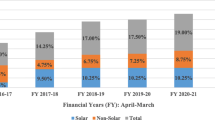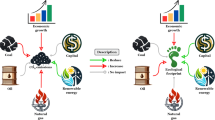Abstract
This paper critically assesses the geopolitical and geo-economic impact of novel fuel resources on both resource exporters and importers. Presently, very strong political and economic forces drive the utilisation of domestic, unconventional oil and gas recovery in the West as these enhance energy security and ease balance of payment issues. The additional capacity generated by this trend has, supported by other effects such as Saudi Arabia’s decision to maintain current production, triggered a significant reduction of oil prices. Consequently, it is now oil exporters that struggle with the balance of payment issues and often these countries base their fiscal budget completely on fossil fuel revenues. In fact, these unconventional resources help turn the tide while oil exporters are now politically significantly weakened due to the increased energy sufficiency of the West. The catch is that the extraction of unconventional types of oil has many environmental implications. So, internalising the environmental externalities have to be considered. This paper, therefore, assesses, next to geopolitics and geo-economics, the environmental implications of this trend.
Similar content being viewed by others
References
Campbell C J, Laherrère J. The end of cheap oil. Scientific American, 1998, 278(3): 78–83
Inderwildi O R, King D A. Energy, Transport and the Environment: Addressing the Sustainable Mobility Paradigm. London: Springer Heidelberg, 2012
Fantazzini D, Höök M, Angelantoni A. Global oil risks in the early 21st century. Energy Policy, 2011, 39(12): 7865–7873
Van Moerkerk M. Crijns-Graus W. A comparison of oil supply risks in EU, US, Japan, China and India under different climate scenarios. Energy Policy, 2016, 88: 148–158
Owen N A, Inderwildi O R, King D A. The status of conventional world oil reserves–hype or cause for concern? Energy Policy, 2010, 38(8): 4743–4749
Campbell C J. Campbell’s Atlas of Oil & Gas Depletion. Springer, 2013
Murray J, King D A. Climate policy: oil’s tipping point has passed. Nature, 2012, 481: 433–435
Arezki R, Blanchard O. Seven questions about the recent oil price slump. 2014-12-22, http://blog-imfdirect.imf.org/2014/12/22/seven-questions-about-the-recent-oil-price-slump/
Emily Cadman. Oil price slump shot in the arm for global economy, says IMF. 2014-12-22, http://www.ft.com/cms/s/0/fa5426ac-89fa-11e4-9b5f-00144feabdc0.html#axzz4E1dUyXKI
Statistics Division of the International Energy Agency. Crude Oil Production. 2015-03, http://www.eia.gov/dnav/pet/pet_crd_crpdn_adc_mbblpd_a.htm
Fratzscher M, Schneider D, van Robays I. Oil prices, exchange rates and asset prices. ECB Working Paper 1689, 2014
Czech National Bank. Inflation report II. 2011, https://www.cnb.cz/miranda2/export/sites/www.cnb.cz/en/monetary_policy/inflation_-reports/2011/2011_II/download/ir_II_2011.pdf
Sachs G. Panel: the new oil order. 2015-02-24, http://www.goldmansachs.com/our-thinking/talks-at-gs/new-oil-order.html
McGlade C, Ekins P. The geographical distribution of fossil fuels unused when limiting global warming to 2°C. Nature, 2015, 517(7533): 187–190
Hall C, Klitgaard K. Energy and the Wealth of Nations— Understanding the Biophysical Economy. NewYork: Springer, 2012
Murphy D J, Hall C A S. Year in review—EROI or energy return on (energy) invested. Annals of the New York Academy of Sciences, 2010, 1185(1): 102–118
Bergerson J, Keith D. Life cycle assessment of oil sands technologies. Alberta Energy Futures Project. Institute for Sustainable Energy, Environment, and Economy (ISEE), University of Calgary, 2006
Hall C A S. Energy return on investment. 2013-05-09, http://energy-reality.org/wp-content/uploads/2013/05/09_Energy-Returnon- Investment_R1_012913.pdf
Inderwildi O R. Siegrist F, Dickson R D, Hagan A J. The feedstock curve: novel fuel resources, environmental conservation, the force of economics and the renewed east–west power struggle. Applied Petrochemical Research, 2014, 4(1): 157–165
Grubb M. Emissions trading: cap and trade finds new energy. Nature, 2012, 491: 666–667
Inderwildi O R, King D A. Quo vadis biofuels. Energy & Environmental Science, 2009, 2(4): 343–346
Inderwildi O R, Jenkins S J, King D A. Mechanistic studies of hydrocarbon combustion and synthesis on noble metals. Angewandte Chemie International Edition, 2008, 47(28): 5253–5255
Chapman I. The end of peak oil? Why this topic is still relevant despite recent denials. Energy Policy, 2014, 64: 93–101
Campbell C J. The anomalous age of easy energy. In: Inderwildi O R, King D A, eds. Energy, Transport, & the Environment. Springer, 2012
Lutz C, Lehr U, Wiebe K S. Economic effects of peak oil. Energy Policy, 2012, 48: 829–834
Author information
Authors and Affiliations
Corresponding author
Rights and permissions
About this article
Cite this article
Inderwildi, O.R., King, D.A. Energy shift: decline of easy oil and restructuring of geo-politics. Front. Energy 10, 260–267 (2016). https://doi.org/10.1007/s11708-016-0416-8
Received:
Accepted:
Published:
Issue Date:
DOI: https://doi.org/10.1007/s11708-016-0416-8




